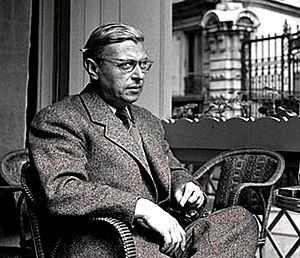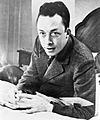Existentialism facts for kids

Existentialism is a way of thinking about what it means to be a human being. It's a type of philosophical movement that became popular in the 19th and 20th centuries. A Danish philosopher named Søren Kierkegaard (1813–1855) is often seen as its founder.
Existentialism suggests that people have free will and can make their own choices. It also reminds us that we are all mortal, meaning we won't live forever. This idea encourages us to think carefully about the choices we make in life.
Contents
What Existentialists Believe
People who follow existentialism think that the world and human life don't have a meaning on their own. Instead, they believe that we give life its meaning. This means we are born into the world first, and then we create our own purpose or "essence."
A famous existentialist, Jean-Paul Sartre, once said, "We are condemned to be free." This sounds a bit strong, but it means we always have to make choices. Even if we try not to choose, that's still a choice! Because of this, we are fully responsible for the decisions we make.
Existentialists believe that humans don't have a fixed nature. We create who we are through our actions and choices. This is why the decisions a person makes are so important. They think each person must decide for themselves what is right or wrong, and what is good or bad.
Big Questions and Feelings
Existentialists often ask deep questions like:
- What is it truly like to be a person in the world?
- How can we understand what it means to be free?
This way of thinking is sometimes linked to feelings like anxiety (worry) and dread (a very strong fear). It also involves being aware that we will eventually die (mortality). Some existentialist thinkers, like Sartre and Martin Heidegger, believed that thinking about these feelings can actually help people choose how they want to live their lives.
Existentialism vs. Nihilism
Existentialism is sometimes confused with nihilism, but they are different.
- Nihilism says that human life has no meaning or purpose at all.
- Existentialism, on the other hand, says that people must choose their own purpose and create meaning for themselves.
Images for kids
-
Clockwise from top left: Søren Kierkegaard, Fyodor Dostoevsky, Jean-Paul Sartre, Friedrich Nietzsche.
-
French philosophers Jean-Paul Sartre and Simone de Beauvoir.
-
French philosopher, novelist, and playwright Albert Camus.
-
Adolphe Menjou (left) and Kirk Douglas (right) in Paths of Glory (1957)
-
First edition of The Trial by Franz Kafka (1925)
See also
 In Spanish: Existencialismo para niños
In Spanish: Existencialismo para niños
 | James B. Knighten |
 | Azellia White |
 | Willa Brown |






